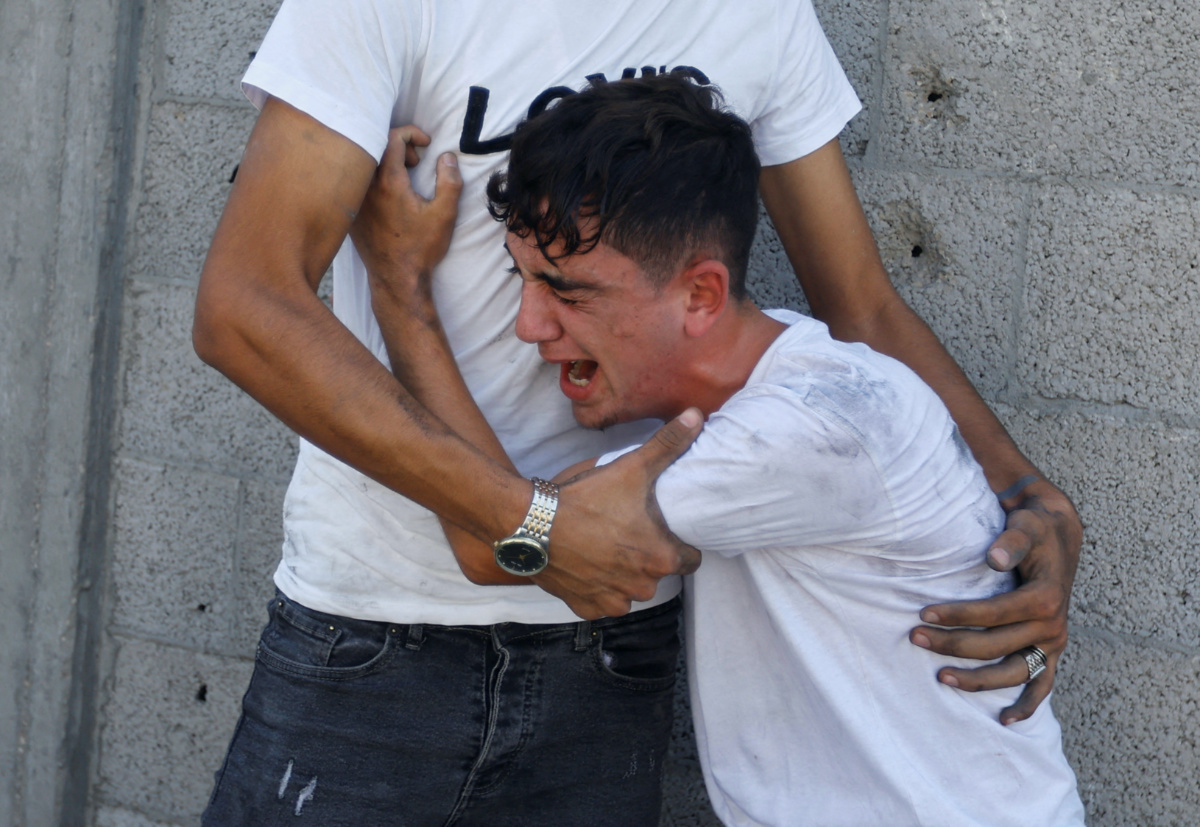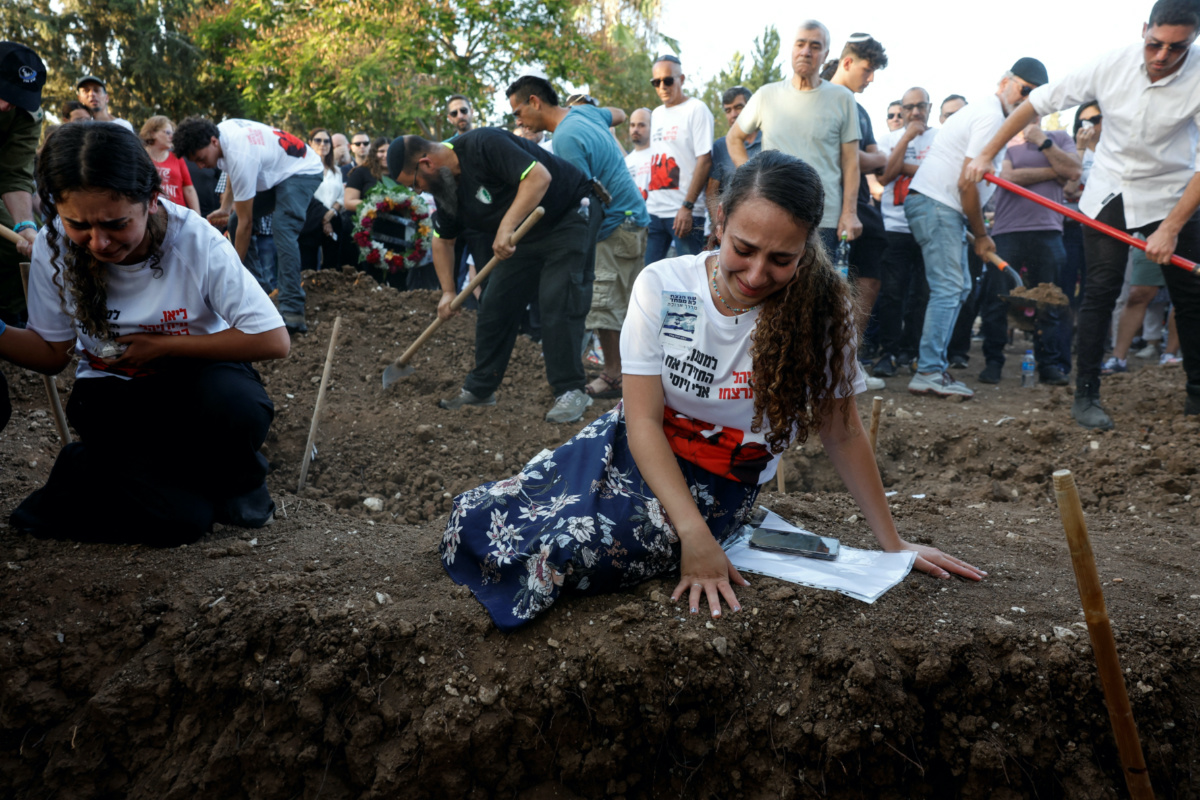
MEREDITH BENSON, of Baptist World Aid Australia, wonders how can we hear the radical call of Jesus, the Prince of Peace, in a world so committed to conflict?…
Sydney, Australia
When Jesus said “love your enemies”, He was living in the middle of a very polarised culture. There wasn’t a happy peace between the Roman Empire and Israel. There was resentment and anger, as well oppression and exploitation. There were sides to be taken. And many in Israel were hoping Jesus would take theirs.
These communities had seen, in their study of the Law and the Prophets, and longed for the coming of a conquering Messiah. One who would liberate them once and for all from the centuries long cycle of oppressive domination – of which the Romans were merely the latest in a long line of oppressors.

A Palestinian man reacts during a search for casualties following an Israeli strike on a house, in Khan Younis, in the southern Gaza Strip, on 25th October, 2023. PICTURE: Reuters/Ibraheem Abu Mustafa.
In recent weeks, as heartbreaking violence escalates in Israel and Palestine – and even as division in our communities at home were writ large – I found myself asking again, what does it mean that Jesus was named the “Prince of Peace” (Isaiah 9:6)? What does it mean that He spent His time on earth distributing love and forgiveness in every interaction, culminating in a sacrificial death for all, on a cross? When He could have conquered every oppressive force once and for all, why did Jesus lead with peace, and with sacrifice?
You’ve heard It said
In Matthew, Jesus makes a direct challenge to the burning hope for a conquering Messiah. And He explicitly redirects a framework of violence and retribution that many – or at least the Zealots – among his audience would’ve found hard to take – “You’ve heard it said…but I tell you…”
“In Matthew, Jesus makes a direct challenge to the burning hope for a conquering Messiah. And He explicitly redirects a framework of violence and retribution that many – or at least the Zealots – among his audience would’ve found hard to take – ‘You’ve heard it said…but I tell you…'”
It’s a well-known moment. The eye for an eye retribution is replaced with turning the other cheek. The love your neighbour, but hate your enemy, is replaced with love your enemies and pray for those who persecute you (Matthew 5:38-44). I imagine some in the audience might have been ready to cheer each first statement but were quickly deflated by the second.
If you’ve ever been personally affronted, hurt or even abused by another person, this reversal of revenge for tolerance and greater love is very difficult to swallow. But Jesus is firm.
Hate your enemy?
It’s worth returning to the verses in the Old Testament Jesus is referring to in Matthew, to understand just how radical and direct his teaching in this moment was and still is.
In Exodus, 21:23-25, we read “if there is serious injury, you are to take life for life, eye for eye, tooth for tooth, hand for hand, foot for foot, burn for burn, wound for wound, bruise for bruise.”
This isn’t self-defence, it’s a violent retribution. But Jesus takes it and drains all the violence out of it. There will be no retribution. Only the other cheek, and sacrificial love – give them your coat; in fact, double down and give them more than they ask for; go twice the distance (Matthew 5:41).
The next statement Jesus makes about hating your enemies is a strange one as there isn’t anything in the Old Testament that says,”hate your enemies:”. There is the command to love your neighbour as yourself, but there are also instructions to love your enemy – to not hold a grudge (Leviticus 19:18), and to give your enemy food or water if they are in need (Proverbs 25:21).
So, when Jesus says “you have heard it said ‘love your neighbour and hate your enemy’”, He is obviously not misquoting Scripture; He’s challenging the bad theology of the day. There is no permission given to hate those who persecute you – not from God’s word, and not from common misinterpretations of it.
Jesus modelled this in real-time for His disciples when he was being arrested by his ‘enemies’. The disciples were ready to step in in self-defence, with violence. Without hesitation, Peter cut off the ear of the servant of the High Priest (Luke 22:49-51). But Jesus rebukes him firmly, ‘“No more of this!” And He touched the man’s ear and healed Him.’
Taking sides
In the particular conflicts of our day – at home and overseas – people often demand we take sides. Both online and on the streets, it’s very clear in the minds of most individuals who’s in the wrong. We live in a divided and polarised time but so did Jesus. And His challenge to dismantle those divisions with a commitment to peace, and to love, remains as potent today as it was during the Sermon on the Mount.
As a humanitarian organisation, we’re not only committed to peace because it sounds like Jesus but there are four guiding principles we’re compelled to abide by:
• Humanity: human suffering must be addressed wherever it is found. The purpose of humanitarian action is to protect life and health and ensure respect for human beings.
• Impartiality: humanitarian action must be carried out on the basis of need alone, making no distinctions on the basis of nationality, race, gender, religious belief, class of political opinions.
• Neutrality: humanitarian actors must not take sides in hostilities or engage in controversies of a political, racial, religious, or ideological nature.
• Independence: humanitarian action must be autonomous from the political, economic, military, or other objectives that any actor may hold in relation to areas where humanitarian action is being implemented.

Friends and family mourn British-Israelis Lianne Sharabi and her daughters Noiya Sharabi, 16, and Yahel Sharabi, 13, who were killed following the deadly infiltration by Hamas gunmen from the Gaza Strip, while her husband Eli is missing, at their funeral in Kfar Harif, Israel, on 25th October, 2023. PICTURE:
During age long divisions and conflicts, the principles of impartiality and neutrality are so important if we’re going to be able to serve those most vulnerable – especially when they’re innocent children who had no say in where they were born, to whom, or at what time in history. And ultimately, this means we trade in any right, or desire, to take a side. The challenge is that our culture is addicted to argument. Language has so much power. And the language we use to condemn the ‘other side’ and to silence one another, is not in the spirit of the radical, sacrificial love modelled to us by Jesus. And it is a denial of the immutable image of God (Imago Dei) in our brother or sister who holds a different view.
I can’t help but hear the voice of Jesus today, “No more of this!”
We rely on our readers to fund Sight's work - become a financial supporter today!
For more information, head to our Subscriber's page.
The side of justice
In the conversations around conflict in the Middle East, there is a lot of passion. Much of it motivated by love and deep concern for human life. But as Christians, we need first to be deeply formed by the Prince of Peace. And as such this means affirming the dignity of every human – because every human has been made in the image of God.
We are, all of us, made for creativity and for connection. But we are all broken people living in a broken world, longing – groaning- for the restoration of all things. And this surely means restoration of both the oppressed and the oppressor who were both in the crowd on the mountain that day recorded in Matthew. All are invited into liberation to live in the fullness of life God intends – the fullness of their Imago Dei.
Writer Cole Arthur Riley, puts it like this: “Justice can never be severed from mercy. The two sway and balance each other as we move into the stories of our and others’ wrongs…Justice doesn’t choose whose dignity is superior. It upholds the dignity of all those involved, no matter whom it offends or what it costs. Even when demanding retribution, justice does not demean the offender’s dignity; it affirms it. It communicates that what has been done is not what the offender was made for. They, too, were made for beauty. In justice, everyone becomes more human, everyone bears the image of the divine. Justice does not ask us to choose.”
Jesus did, of course, ultimately take the side Israel needed Him to take. It’s also the side we needed Him to take. He was, and is, the salvation of the whole world. And to this day, even in our polarised and divided world, He is the one who is reconciling all things – and He’s calling us to step out of our ‘side’ and join Him.
Meredith Benson is communication lead at Baptist World Aid Australia.






